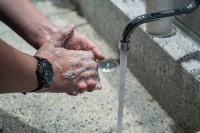
A team of researchers from the National Institute of Environmental Health Sciences in Europe, have shown a link (by as much as 5%) to some bladder cancers by the use of chlorination for treating public drinking water in Ireland and some other European countries. In the research, chlorine is shown as being the most common chemical disinfectant used in the purification of surface water for drinking purposes. However, in the chlorination process, free chlorine reacts with organic compounds in the water which then creates byproducts including THM’s (Trihalomethanes), which are being associated with a bladder cancer risk.
Countries showing the highest levels of bladder cancer cases linked to THM’s were Cyprus, Greece, Ireland, Malta and Spain where chlorination is generally used. Countries with the lowest rate of bladder cancer were Denmark and the Netherlands where chlorination is not used. It should be pointed out that there is no unequivocal evidence that THM’s cause bladder cancer only a link and it should be noted that the benefits of water disinfection and chlorination far outweigh a small increase in the risk of bladder cancer.
As the research shows, Ireland is one of nine countries exceeding current average THMs levels in drinking water. This could lead to an increase in the number of bladder cancer cases unless measures are adopted to improve or change water treatment and disinfection methods among other measures, without compromising the quality of drinking water. Home owners could include additional filtration such as point-of-use water filters or a whole-house water filter systems in their homes, or by using a filter jug with an activated carbon filter would help remove the chlorination by-products.
For anyone worried about THMs or other chemical contaminants in their household water supply, the installation of a quality under-sink water filter or filtration system will purify the water and provide long term protection and peace of mind.

